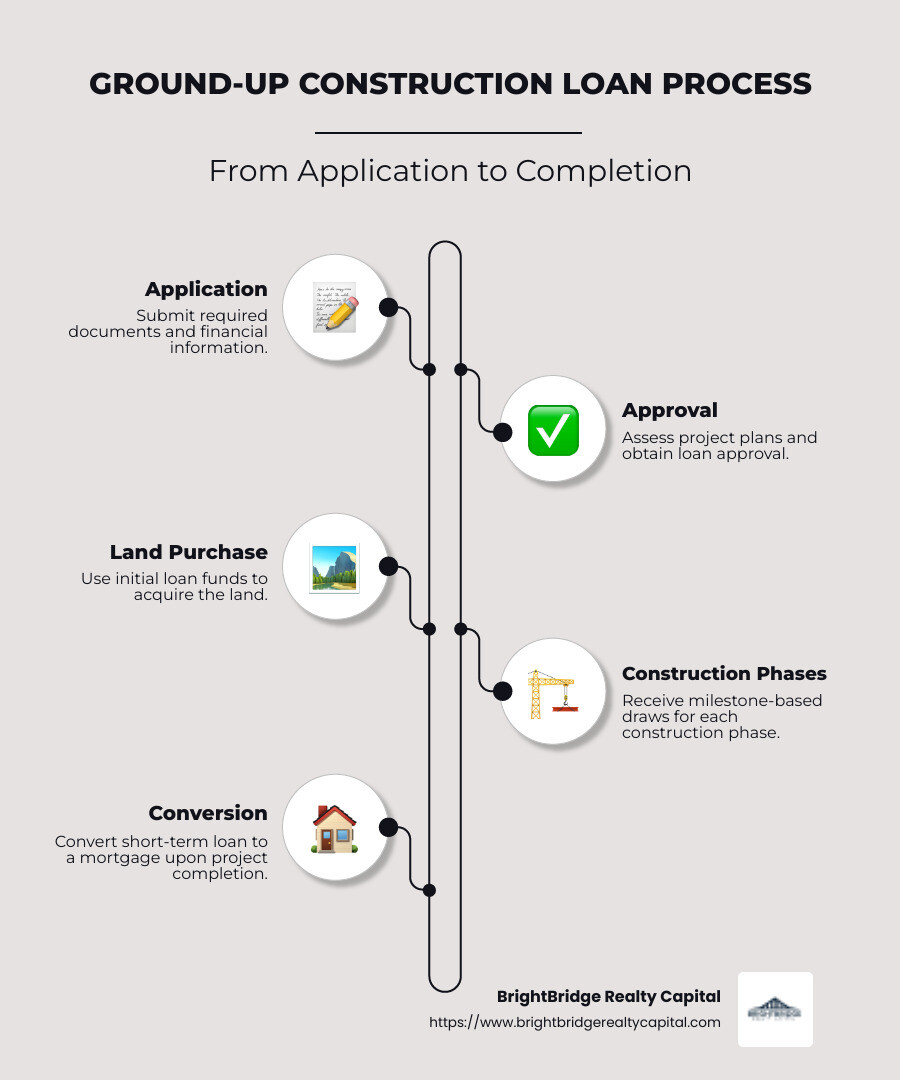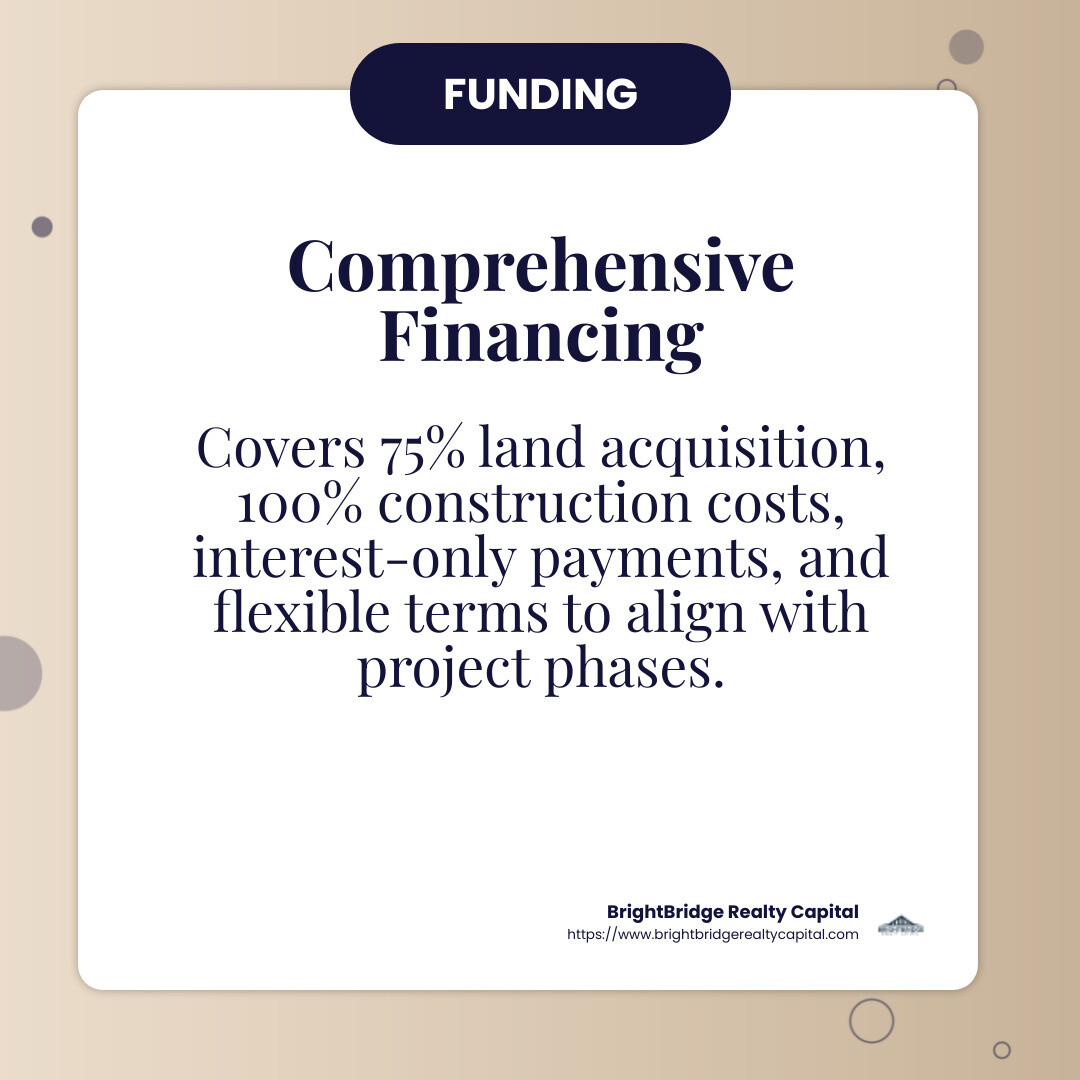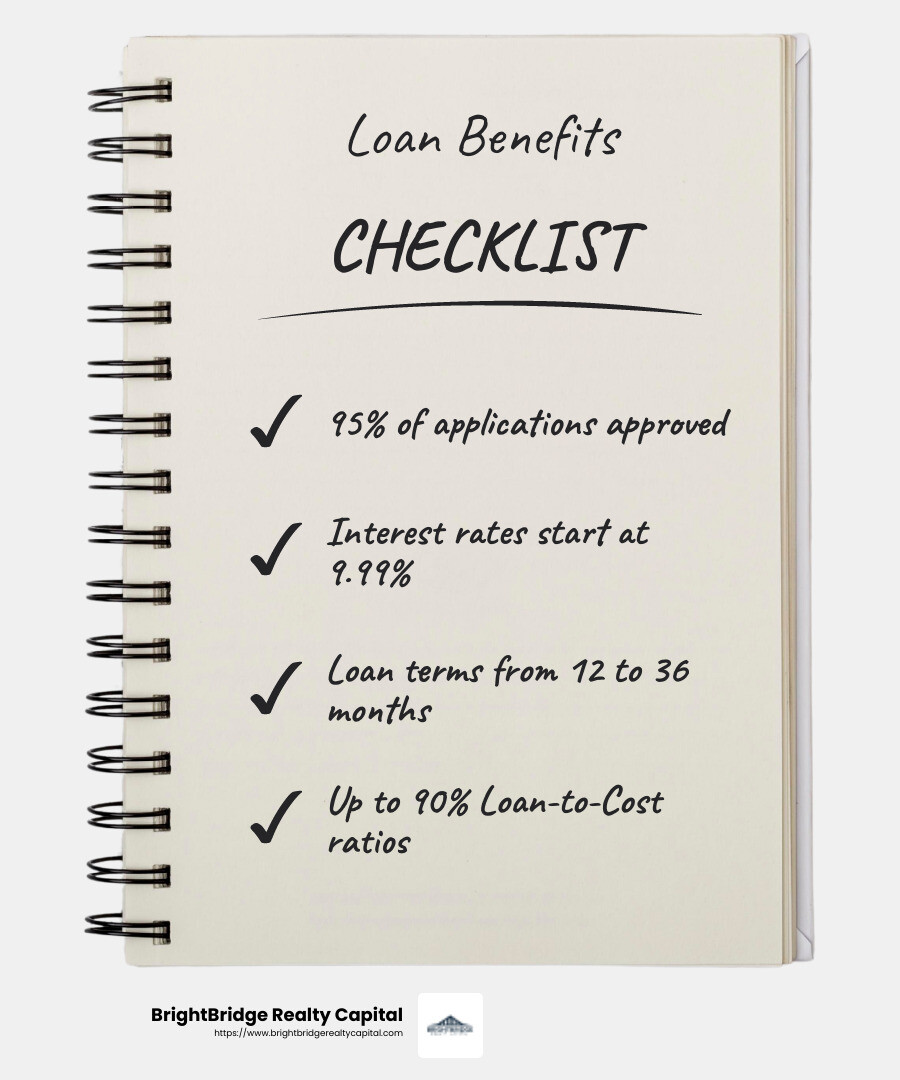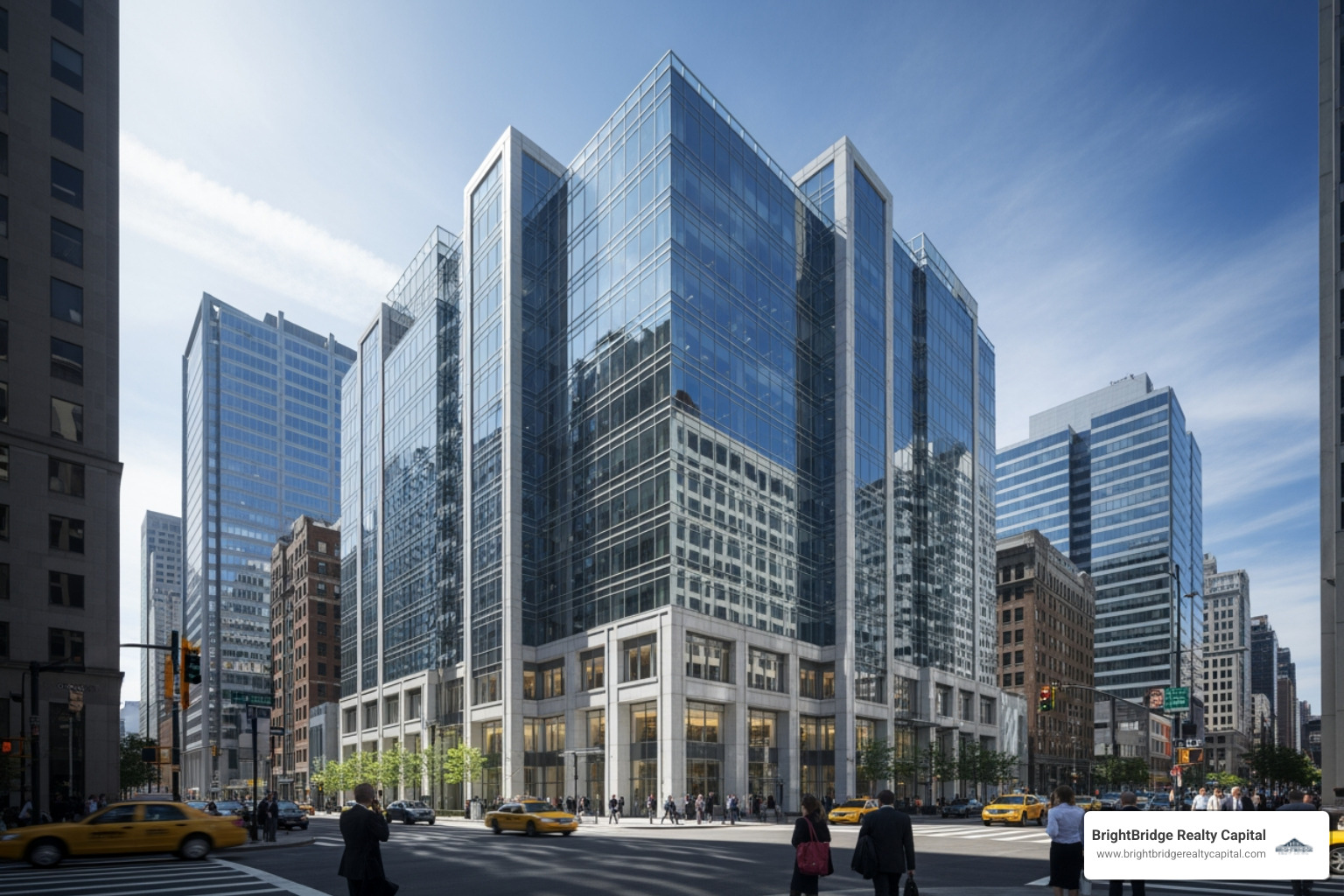From Ground to Glory: Understanding Ground-Up Construction Loans

Ground-up construction loans are vital in real estate development. These specialized loans provide the necessary financing to transform a vacant plot into a vibrant building, whether it's a single-family home or a multi-unit complex. For developers in New York and beyond, understanding these loans can open up numerous opportunities.
Here's what you need to know right away about ground-up construction loans:
- Purpose: Finance the entire construction process from land purchase to building completion.
- Loan Structure: Typically short-term, interest-only, with funds released in stages.
- Benefits: Flexibility in funding and conversion options to long-term mortgages upon completion.
In today's competitive real estate market, having the right financing solution is crucial. As prices rise and the demand for housing grows, securing a ground-up construction loan can be a smart strategy for real estate investors looking to expand their portfolios quickly and efficiently. BrightBridge Realty Capital offers streamlined solutions to support your construction projects every step of the way.

Ground-up construction loans terms made easy:
What Are Ground-Up Construction Loans?
Ground-up construction loans are a comprehensive financing solution for real estate development projects. These loans cover the entire project lifecycle, from purchasing the land to constructing the building. This end-to-end financing ensures that developers have the funds needed at each stage of their project.
Comprehensive Funding
Ground-up construction loans offer comprehensive funding for various types of projects, including single-family homes, multi-unit residences, and mixed-use developments. This type of loan covers:
- Land acquisition: Up to 75% of the land purchase price or its current market value.
- Construction costs: 100% of the construction budget, ensuring that every aspect of the build is financially supported.
Project Lifecycle
The project lifecycle of ground-up construction loans is designed to align with the different phases of development:
Planning and Approval: Before funds are disbursed, developers need to present detailed architectural plans, budgets, and timelines. This helps ensure that the project is viable and reduces risks for both the lender and the borrower.
Construction Phase: Funds are released incrementally through a loan draw process. This means money is disbursed as each stage of construction is completed and inspected. This method helps manage cash flow and ensures funds are used efficiently.
Completion and Conversion: Once the construction is complete, these loans can be converted into traditional mortgages. This simplifies the repayment process and often results in lower interest rates for the borrower.
End-to-End Financing
The end-to-end financing provided by ground-up construction loans offers several advantages:
Interest-Only Payments: Borrowers only pay interest on the funds drawn, not the entire loan amount. This keeps payments lower during the construction phase.
Flexibility: These loans can be custom to fit the specific needs of the project, offering options like cash-out refinancing or transitioning to long-term financing.
Streamlined Process: With lenders like BrightBridge Realty Capital, the focus is on minimizing restrictions and simplifying the application process. This allows developers to focus on building rather than navigating complex financing problems.

By understanding the comprehensive nature and benefits of ground-up construction loans, developers can effectively plan and execute their real estate projects. This type of financing is not just a loan; it's a strategic tool for building success from the ground up.
Key Benefits of Ground-Up Construction Loans
Ground-up construction loans provide developers with a range of benefits that make them an attractive option for financing real estate projects. These loans are designed to offer flexibility, simplicity, and efficiency, ensuring that developers can focus on building rather than worrying about financing.
Flexible Terms
One of the standout features of ground-up construction loans is their flexible terms. These loans can be customized to meet the unique needs of each project, accommodating various property types, from single-family homes to large multi-unit developments. With loan amounts ranging from $250,000 to $10,000,000, developers can secure the funding they need, whether they are building a cozy residence or a sprawling complex.
- Loan-to-Cost (LTC) Ratios: Up to 90% LTC, providing substantial leverage for developers.
- Interest Rates: Starting at 9.99%+, which are competitive given the short-term nature and risk associated with construction loans.
- Loan Terms: Typically ranging from 12 to 36 months, offering the flexibility to align with project timelines.
Simplified Documentation
Ground-up construction loans also feature simplified documentation requirements. Unlike traditional loans, which often involve extensive paperwork and lengthy approval processes, these loans streamline documentation to make it easier for developers to access funds quickly.
- Hassle-Free Application: A straightforward application process that focuses on key project details rather than overwhelming paperwork.
- In-House Support: Expert guidance from lenders like BrightBridge Realty Capital ensures that documentation is collected and reviewed efficiently, reducing delays.
Milestone-Based Draws
Another significant advantage of ground-up construction loans is the use of milestone-based draws. This approach to disbursing funds ensures that money is released as specific phases of the project are completed, promoting financial discipline and project accountability.
- Incremental Funding: Funds are disbursed through a series of draws, similar to a line of credit, which helps manage cash flow and ensures funds are used effectively.
- Interest-Only Payments: Borrowers pay interest only on the funds drawn, not the entire loan amount, keeping costs manageable during construction.

These benefits make ground-up construction loans a smart choice for developers looking to maximize their investment and minimize financial stress. By offering flexible terms, simplified documentation, and milestone-based draws, these loans provide the necessary support to turn architectural visions into reality.
How Ground-Up Construction Loans Work
Understanding how ground-up construction loans operate is crucial for developers. These loans are structured to support the entire building process, from land acquisition to project completion. Here's a closer look at how they work:
Loan Draw Process
The loan draw process is a key feature that sets ground-up construction loans apart from traditional financing. Instead of receiving a lump sum, borrowers access funds in stages.
Incremental Disbursements: Funds are released based on project milestones. This means you get the money when you need it, as each phase of construction is completed.
Inspector Evaluations: Before releasing funds, lenders often require an inspector to verify that the specified work is done. This ensures accountability and progress.
This draw process helps manage cash flow effectively, ensuring that funds are available when they are most needed.
Interest-Only Payments
During construction, borrowers benefit from making interest-only payments.
Cost Efficiency: You only pay interest on the money you’ve drawn, not the entire loan amount. This keeps payments lower during the build.
Flexibility: It allows you to focus financial resources on the construction itself rather than hefty loan payments.
Once the construction is complete, the loan can often be converted into a traditional mortgage, simplifying long-term repayment.
Short-Term Loans
Ground-up construction loans are typically short-term, aligning with the time needed to complete a project.
Loan Terms: These loans generally have terms ranging from 12 to 18 months. This short-term nature reflects the risk and dynamic nature of construction projects.
Transition to Permanent Financing: After construction, many developers choose to convert these loans into a standard mortgage, providing a seamless transition to long-term financing.
This short-term structure is designed to support the rapid pace of construction while providing the flexibility to transition to more permanent financial solutions once the project is finished.
By understanding these elements—loan draw process, interest-only payments, and short-term nature—developers can better steer the complexities of financing their construction projects with confidence and clarity.
Qualifications for Ground-Up Construction Loans
Securing ground-up construction loans requires meeting certain qualifications. These criteria ensure that borrowers are financially stable and capable of completing their projects. Here's what you need to know:
Credit Score
A good credit score is essential.
Minimum Requirement: Generally, a score of at least 680 is needed. However, a score of 720 or higher is ideal for better loan terms.
Why It Matters: Lenders want assurance that you have a history of timely payments. A strong credit score minimizes their risk.
If your score is lower, consider steps to improve it before applying.
Income Verification
Lenders need proof of steady income to ensure you can handle loan repayments.
Documentation Needed: Be ready to provide pay stubs, bank statements, and other financial documents. These show your ability to manage both existing debts and new loan payments.
Importance: Steady income reassures lenders that you can cover payments throughout the construction period.
Down Payment
A significant down payment is usually required for these loans.
Typical Requirement: Expect to make a down payment of at least 20%. Some lenders might ask for between 25% and 30% of total construction costs.
Purpose: This upfront payment reduces the lender's risk and shows your investment in the project.
Meeting these qualifications can improve your chances of securing a ground-up construction loan with favorable terms. By understanding the importance of credit score, income verification, and down payment, you can better prepare for the application process and move forward with your construction project confidently.
Frequently Asked Questions about Ground-Up Construction Loans
What is the minimum credit score required?
To qualify for ground-up construction loans, you generally need a minimum credit score of 680. This shows lenders that you have a history of making payments on time. While 680 is the baseline, a score of 720 or higher can improve your chances of approval and might lead to better terms. Higher scores reassure lenders, reducing their perceived risk.
Can these loans close in an LLC or business entity?
Yes, ground-up construction loans offer the flexibility to close in an LLC or business entity. This option is beneficial for builders and investors who want to keep their personal and business finances separate. Using an LLC can also provide liability protection and might offer tax advantages. This flexibility makes it easier for business-minded individuals to manage their construction projects.
Are permits required for ground-up construction loans?
Yes, obtaining permits is a necessary step in the ground-up construction loan process. Permits ensure that your project complies with local regulations and building codes. Before funds are released, lenders will typically require proof that all necessary permits have been secured. This step helps avoid legal issues and ensures your project is built to standard. Regulatory compliance is crucial to avoid delays and additional costs during construction.
Conclusion
At BrightBridge Realty Capital, we understand that starting on a construction project is a complex journey. That's why we offer customized financing solutions designed to meet the unique needs of each project. Our ground-up construction loans are custom to provide the flexibility and support you need from start to finish.
One of our standout features is our ability to offer fast closings, often within a week. This speed allows you to seize opportunities and begin your project without unnecessary delays. Our process is straightforward and seamless, ensuring that you can focus on what really matters—building your vision.
Our loans are direct, with no intermediaries, which means competitive rates and a more personal approach. We make it our mission to remove barriers, so you can concentrate on growing your real estate portfolio.
Whether you're building a single-family home or a multifamily development, we are here to support your journey every step of the way. With BrightBridge Realty Capital, you can lay the groundwork for success with confidence.
Find how BrightBridge Realty Capital can support your next project.


